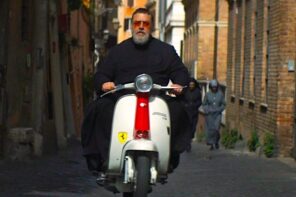David Brat, the surprise Republican primary victor over House Majority Leader Eric Cantor, received a Master of Divinity from Princeton Theological Seminary. He has also stated that he had at one time wanted to teach systematic theology and ethics and described his win as a God-given “miracle:” “God acted through the people on my behalf.”
Based on this, it would be natural to wonder whether Brat intends to legislate his religious beliefs if elected—and more to the point, what those beliefs actually are.
Turns out that’s a tricky question. Since Brat has only recently come to national attention, the source material here is pretty thin, and as Candida Moss has pointed out, it’s characterized by deep intellectual incoherence. There’s his PhD dissertation from American University, of which the last chapter is a discussion of Protestantism and science in the nineteenth century. There’s his unpublished textbook on economics and philosophical ethics, The Philosophy of Economics: A History of Science, Method and Ethics. And there is also the article he wrote in 2011 for the journal Interpretation, entitled “God and Advanced Mammon – Can Theological Types Handle Usury and Capitalism?”
In that article, Brat defends usury against unnamed “theological types” who believe it un-Christian to charge interest on loans based on the historic proscription of usury. Here, curiously, Brat describes himself as an “orthodox Calvinist” and describes his theological tradition as “the Reformation,” even though his campaign site says that he attends a Roman Catholic Church.
His Curriculum Vitae does little to shed light on the matter of his ecclesial home. Under “Affiliations” are listed four different congregations: St. Michael’s Catholic Church, Christ Church Episcopal, Third Presbyterian Church, and Shady Grove Methodist Church. (No dates or locations are given.) Brat’s interview with The National Review supports this picture of theological eclecticism, inasmuch as he cites John Calvin, Karl Barth, and Reinhold Niebuhr as influences.
Lastly, we have his own words during the campaign, in which he bemoans the dearth of philosophical and theological celebrities. Via Mother Jones:
Who is [sic] our great moral teachers these days? Every generation has always had great theologians or philosophers by the century that you can name. Who do we got right now? [Audience: Jay-Z] Right. Right. [Audience: Beyoncé] Right. Beyoncé. When you can’t name a serious philosopher, a national name, or a serious theologian, or a serious religious leader, at the national level, your culture’s got a major problem. We got a major problem.
None of these pieces of evidence—whether taken alone or as a group—are enough to give a coherent picture of Brat’s theology, let alone how that theology would influence his thoughts on public policy. (In our opinion, and with all due respect to ThinkProgress, there simply isn’t enough evidence to suggest that David Brat believes that the United States must “embrace Christian capitalism or Hitler will come again.”
What’s striking, though, is how far from coherent the evidence is. It isn’t just that these snippets and bits fail to add up to something theologically coherent, and therefore we should refrain from speculating. Rather, it’s that these snippets and bits are in tension with one another. Here are just a few of the tensions we have identified in Brat’s public theological statements. (As of this writing, a request to Brat for clarification has not been returned.)
- Alasdair MacIntyre didn’t believe in objective reason, unmoored from any tradition.
In “God and Advanced Mammon,” Brat calls upon moral philosopher Alasdair MacIntyre to support his claim that traditions have their own internal logic that is at once rational and wholly internal to that tradition.
What MacIntyre (and his many fans) dislike about modernity is its alleged forgetfulness of this fact. But as near as we can tell, Brat invokes MacIntyre in an effort to dismiss the possibility of communal ethical discernment in favor of the individual freedom of libertarianism—quite the opposite of MacIntyre’s insistence that ethical reasoning can only occur within a commonly-held tradition.
In Brat’s interpretation, the Reformation tradition is that “morality and judgment ultimately occur at the individual level,” meaning that “an analysis of the morality of any action would ultimately rely upon the facts and intentions in each individual case.”
In other words, we can’t know if high-interest payday loans are immoral without knowing whether an individual lender intends in his heart to help or exploit the poor.
And if no one but the individual can really know whether a business practice is just or unjust, we have a responsibility not to use the government’s “monopoly on violence” to “coerce our fellow citizens to act in ways that follow our Christian ethical beliefs,” like limiting their interest rates.
Refusing aid to those who are unable to afford food or housing does not, apparently, constitute violence worth considering.
MacIntyreans typically worry that the collapse of internally coherent ethical systems leaves us without a way to argue for the most basic rights (not to be murdered by your neighbor, say). Brat’s anti-MacIntyrean use of MacIntyre falls back on the assumption often decried by MacIntyre: the existence of an Archimedean point from which “objective,” traditionless reason is possible.
In Brat’s view, unlike tradition-bound and individualistic moral reasoning which might introduce limitations on one’s economic choices, the ethical reasoning accessible through universal reason tells us only that we should not interfere with another’s moral choices. He presents the “US founders” as men who recognized this fact, enshrining only negative rights to protect citizens from government interference.
As Brat presents it, while “the founders were intellectually aware” of the right of black persons to be protected from the government’s enforcement of chattel slavery, “the revolutionary period was challenge enough.”
It seems that if we’re faced the choice of whether to defend white men’s right to hold private property or black women, men, and children’s right not to be private property, reason may favor the latter, but the freedom of the market endorses the former.
- Brat was against government restrictions on abortion and gay rights before he was for them.
If you’re wondering how Brat squares this restriction of moral questions to the individual’s heart with his campaign website’s boilerplate Republican promise to “protect the rights of the unborn and the sanctity of marriage, and … oppose any governmental intrusion upon the conscience of people of faith,” that’s unclear.
Three years ago, Professor Brat cited the Right’s efforts to “enforce morality in relation to abortion, gambling, and homosexuality” as evidence of rising government coercion, on par with “health care, welfare programs, retirement benefits, thirteen years of education, and unemployment benefits” as attacks on “the initial vision of liberal America.” Candidate Brat shares the same views on social welfare programs, but seems to have acquired a new willingness to “coerce fellow citizens to action by threat of government power” where abortion and same-sex marriage are concerned.
- If Brat means to identify as a Catholic, one wonders what he has concluded about science.
To be sure, his campaign site only says that he attends a Catholic church, not that he is Catholic. Here’s what’s confusing, though. David Brat is someone who, as recently as 2011, published an article in which he describes himself as an “orthodox Calvinist.”
He lists four different denominational affiliations on his CV. Yet on his campaign website, the only affiliation he indicates is Catholic—even though the final chapter of his dissertation argues that we have Protestantism to thank for science and the modern state.
His argument draws more on economics and sociology than on theology proper, and thus we wish to be careful about analyzing its merits since we are neither economists nor sociologists. Briefly, though, his idea seems to be that Protestantism’s understanding of “church” doesn’t compel it to try and take sole responsibility for social order. That frees up room for a state as such, and with that, the room for scientific inquiry.
We wonder whether Brat’s seeming affiliation with the Catholic Church reflects a rethinking of his view that Protestant Christianity is necessary for the existence of an independent scientific sphere or a rethinking of the value of autonomous science.
- If Brat means to identify as a Catholic, one wonders what has to say about Pope Francis’ recent comments on unfettered capitalism.
Brat’s view that the morality of an economic system is determined primarily by the good or bad intention of individuals does find some backing in Benedict XVI’s encyclical Spe Salvi.
Benedict suggests that “an encounter with the living God” renders the “fight for political liberation” unnecessary: when “masters and slaves” became members of the same Church, “Even if external structures remained unaltered, this changed society from within.”
But more recent papal pronouncements have been more explicit in their concern for structural justice and the failings of the free market system. Famously, Pope Francis’ apostolic exhortation Evangelii Gaudium denounces those who “continue to defend trickle-down theories which assume that economic growth, encouraged by a free market, will inevitably succeed in bringing about greater justice and inclusiveness in the world” as expressing a “crude and naïve trust in the goodness of those wielding economic power and in the sacralized workings of the prevailing economic system.”
While Brat is concerned about the “good hard-working banker” who must charge high interest rates to guard against exploitation by the borrower who “may not like work and may sleep all day and eat snacks while watching television,” Francis warns that love of free-market capitalism leads to a situation where, “Almost without being aware of it, we end up being incapable of feeling compassion at the outcry of the poor, weeping for other people’s pain, and feeling a need to help them, as though all this were someone else’s responsibility and not our own.”
Despite Brat’s deep concern for the “major cultural problem” of being unable to name a “serious religious leader,” he seems entirely uninterested in the widely-publicized teachings of the past year’s most widely discussed religious leader.
In 2011, Brat told theologians and ministers, “if you ever hear an economist giving ethical advice, you should not give that advice much attention.” Given the incoherence and inconsistency of Brat’s views on the place of Christian morality in American democracy, readers may wish to apply the same suggestion to at least one economist’s advice on matters of church and state.




